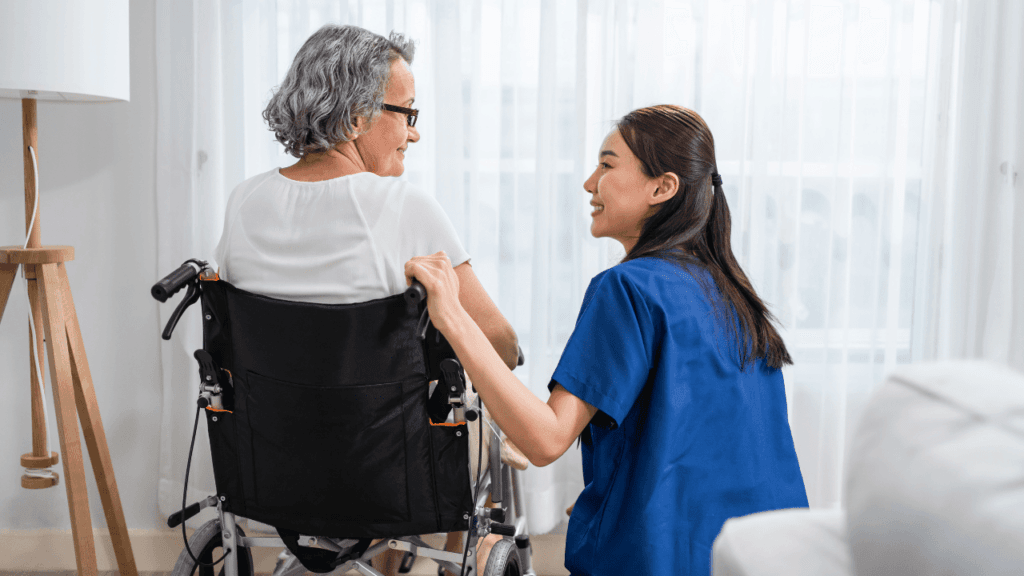
Compassionate Caring for Elderly Loved Ones
As our society changes with longer lifespans and new demographics, caring for the elderly is more crucial. We need more caregivers who understand and Caring for Elderly. Compassionate elder care goes beyond basic needs. It’s about improving an older person’s life at every step.
More adults are becoming primary caregivers, showing the need for caring. The right caregivers create a supportive environment. They help with physical needs and offer emotional support and friendship.
Key Takeaways
- The aging population needs more skilled elderly assistance and compassionate elder care.
- Empathetic caregiving is key to improving seniors’ emotional and physical health.
- New eldercare services help those caring for elderly loved ones while keeping their own well-being.
- More people are choosing assisted living and respite care, showing a shift in caregiving.
- Studies show compassionate care improves patients’ quality of life.
- Caregivers must avoid burnout to keep providing vital support for supporting older adults.
It’s vital for caregivers to connect with support networks and professionals. This helps both the caregivers and their elderly charges. It prevents burnout and ensures top-notch care.
The Growing Need for Compassionate Elderly Care
As the world’s population ages, the need for elderly care grows. Reports and data show that caring for seniors is now crucial. The current care system must quickly adapt to meet the increasing numbers and needs.
Global Demographic Shifts and Elderly Care Challenges
The World Health Organization predicts a huge increase in seniors by 2050. The costs of care, like in Boston, are becoming too high. This shows we need new, affordable ways to care for the elderly.
Many seniors don’t want to accept help, which makes caregiving even harder. They want to stay independent but need care that respects their wishes. This calls for a kinder, more understanding approach to caregiving.
The Role of Caregivers in Addressing the Aging Population
There will be more jobs in personal care as the population ages. Technology, like remote monitoring, can help improve care. Compassionate caregivers play a key role in improving seniors’ lives, as studies show.
Good communication and empathy are key for caregivers. These skills are essential for building trust and effective care. Caregivers need to understand both the emotional and medical needs of seniors.
By improving understanding and use of compassionate caregiving, we can better meet seniors’ needs. This will help create a more caring healthcare system.
Embracing the Caregiver Role with Empathy and Patience
Caring for the elderly requires a lot of patience in caregiving and empathy. These qualities greatly improve the quality of life for seniors. They help create a caring space where seniors feel valued and understood.
Empathy in caregiving goes beyond just doing tasks. It’s about connecting on a personal level. This is key for effective elderly caregiver support. Studies show that empathy and patience make caregiving better and build trust and friendship.
Learning to be empathetic and patient helps with both emotional and physical caregiving needs. These actions help manage stress and reduce frustration in caregiving roles.
| Impact of Empathy & Patience | Expected Benefits in Caregiving |
|---|---|
| Improves communication | Better understanding of seniors’ needs |
| Reduces conflict occurrences | Creates a peaceful caregiving environment |
| Enhances emotional connection | Strengthens bonds, trust, and companionship |
| Sustains caregiver’s mental health | Reduces burnout and emotional exhaustion |
| Fosters a sense of security in seniors | Improves overall quality of life for seniors |
Also, being patient helps in doing tasks carefully. This is important for safety. It also reduces anxiety and fear in seniors.
By embracing these values, caregivers provide better and more caring support. This makes caregiving rewarding for both the caregiver and the senior. It helps seniors age with dignity and respect, highlighting the importance of elderly caregiver support in our society.
Understanding and Overcoming Emotional Challenges
Caring for aging loved ones comes with emotional challenges. Caregivers face stress and need to give a lot of physical and emotional support. This affects the quality of care and the caregiver’s well-being.
Dealing with emotional challenges in eldercare needs a caring approach. It should include both practical and emotional strategies to protect caregivers’ mental health. Spotting signs of burnout is key to good caregiving.
Stress Management for Caregivers
Managing stress is crucial when caring for elderly loved ones. Activities like meditation, deep breathing exercises, and yoga help reduce stress. It’s also important to take regular breaks and get respite care.
This prevents burnout and refreshes the caregiver’s energy and outlook.
Creating an Emotional Support System for Aging Loved Ones
Building a strong emotional support system is vital in elderly care. Talking openly with family, joining caregiver groups, and getting professional advice helps a lot. Also, supporting aging loved ones with healthy food choices and light exercise boosts their mood and health.
In short, handling emotional challenges in eldercare with good caregiver support and stress management helps everyone. It keeps caregivers healthy and happy, and ensures the elderly get the care they need.
Developing Essential Caregiving Skills
Learning and improving caregiving skills is key for those helping seniors. It involves mastering Activities of Daily Living (ADLs) and managing medications well. This keeps seniors safe, happy, and independent.
Assisting with Activities of Daily Living (ADLs)
Knowing how to help with ADLs is vital. Tasks like bathing, dressing, and eating are important for seniors’ freedom and pride. Caregivers must be kind, patient, and respectful to improve seniors’ lives.
Effective Medication Management
Managing medications is another critical part of caregiving. It means knowing what meds are for, giving them on time, and watching for side effects. Doing this right can stop health problems, making it a key skill for senior care.
Knowing a lot about caregiving and using these skills every day is important. Here are some stats and facts about caregiving. They show how important skills in ADLs and medication management are:
| Key Competency | Benefits | Common Challenges |
|---|---|---|
| Activities of Daily Living Support | Enhances dignity and independence | Physical strain, emotional stress |
| Medication Management | Prevents health complications | Complexity of prescriptions, risk of errors |
Improving caregiving skills in these areas helps seniors’ physical and mental health. It also boosts their emotional well-being.
Fostering Independence While Providing Necessary Support
A key part of personalized caregiving is making life better for our elderly loved ones. We do this by promoting independence and giving them the support they need. As people get older, it’s important to find the right balance between helping them and letting them make their own choices.
When independence is hard because of physical or mental challenges, we can help a lot. Using tools like assistive devices and making homes easier to move around in is very important. It helps seniors stay independent and feel good about themselves.
Here are some key statistics that underline the importance of fostering independence amidst caregiving:
| Statistical Aspect | Details |
|---|---|
| Impact on Mental Health | Independence helps prevent feeling lonely and keeps mental health strong. |
| Physical Well-being | Keeping balance and strength helps avoid falls, which can lead to needing to live in a care facility. |
| Enhancing Purpose | Being in charge of daily tasks gives seniors a sense of purpose, which helps their memory and thinking skills. |
| Role of Technology | Home automation systems keep seniors safe and let them do things on their own. |
| Importance of Personalized Care | Personalized caregiving plans meet specific needs, respecting the person’s lifestyle and needs. |
Supporting independence is more than just physical help. It’s about creating an environment where seniors can make their own care choices. This not only respects autonomy but also builds trust and strengthens bonds between caregivers and those they care for.
Promoting independence in seniors means more than just giving tools and support. It’s about encouraging them to join in community activities and programs. This way, caregivers become more than helpers; they become advocates, showing empathy and commitment to a dignified life.
Crafting a Personal Care Plan for Elderly Loved Ones
Creating a personalized care plan is key for eldercare. It offers a structured way to meet seniors’ medical and personal needs. This approach ensures support that fits their unique needs and routines.
Assessment of Unique Needs
To start a strong care plan, a thorough assessment is needed. Health experts check on mobility, thinking skills, and emotional health. This helps figure out what daily activities or medical help is needed, based on each person’s situation.
Incorporation of Personal Preferences and Routines
When making personalized care plans, it’s important to know and follow an elderly person’s lifestyle and likes. This makes them feel comfortable and builds trust with their caregiver. It also improves their quality of life.
Creating a good care plan needs careful planning and talking with everyone involved. This includes family, doctors, and home care workers. Here’s what a typical care plan might include:
| Needs | Goals | Team Members | Task Assignments |
|---|---|---|---|
| Medication Management | Ensure timely medication intake | Caregiver, Nurse | Caregiver oversees daily intake, Nurse reviews weekly |
| Daily Activities | Maintain physical and mental health | Physical Therapist, Family Member | Therapist provides bi-weekly sessions, Family Member assists daily |
| Social Interaction | Enhance social well-being | Family, Friends, Social Worker | Organize weekly visits and social gatherings |
| Long-term Care Planning | Prepare for future needs | Elder Law Attorney, Financial Planner | Annual meetings to update estate and care plans |
It’s important to update the care plan regularly. This ensures the care stays right and effective. It also helps prevent burnout among caregivers, keeping the support system strong.
For elderly health management to work, it needs careful geriatric care management, ongoing updates, and a deep understanding of the senior’s needs and wishes. Working with the whole care team is crucial. It makes sure the elderly’s needs are met in a respectful and dignified way.
Benefits of Compassionate Care for Senior Well-Being
Compassionate care is key to a better life for seniors. It focuses on their emotional and physical health. This approach helps seniors feel good in both body and mind.
Improving Emotional Health of the Elderly
Compassionate care greatly improves mental health for seniors. It fights loneliness and makes them feel valued. This boosts their happiness and emotional wellbeing.
Engaging with seniors deeply is part of compassionate care. It builds strong connections and understanding. Medical students learn to care deeply, showing compassion can be sustained.
The Impact of Compassion on Physical Health Outcomes
Compassionate care also boosts physical health in seniors. Seniors recover faster and feel better when cared for with compassion. Caregivers encourage healthy habits like exercise and socializing.
This care also saves money in healthcare. It reduces the need for unnecessary treatments. It creates a thriving environment for both caregivers and seniors.
In summary, compassionate care is vital for seniors’ health. It improves their immediate and long-term wellbeing. It ensures they age happily and healthily.
Specialized At-Home Care Alternatives
The need for specialized care for seniors is growing. This is because more people are living longer. In-home care services offer personalized care in a familiar setting. It helps keep seniors’ dignity and meets their health and emotional needs.
Advantages of In-Home Care For Seniors
In-home care for seniors has many benefits. It starts with personalized attention in their own home. This care improves their quality of life by focusing on their unique needs and preferences.
In-home senior care helps seniors stay in their routines. It provides the help they need to stay safe and healthy. This includes managing medications, helping with daily tasks, and offering companionship.
Choosing the Right Home Care Provider
Choosing the right provider is important. Look at their qualifications, if they meet your senior’s needs, and the quality of care. Make sure they are reputable and care about their clients’ wellbeing.
Senior living assistance options vary. Families need to understand the costs and what care is included. Here’s a breakdown of common expenses and how they are usually paid for.
| Service | Coverage by Medicare | Coverage by Medicaid | Private Insurance Coverage | Out-of-Pocket Costs |
|---|---|---|---|---|
| Home Health Services | Limited/Short-term | Varies by state | Generally not covered | Hourly charges |
| Meal Delivery Services | Short-term in specific cases | For eligible individuals | Not typically covered | Some free, others charge or accept donations |
| Emergency Medical Alerts | Not covered | Potentially covered | Covered by some | Initial fee + monthly service fee |
Choosing in-home senior care requires careful thought. Understand the costs, services, and how they meet your senior’s needs. With the right care, seniors can live better and happier lives.
Preparing for the Long-Term: Advanced Planning for Elder Care
In today’s world, long-term elder care planning is a must. It helps keep our seniors’ dignity and well-being. Families need to plan for the future, focusing on legal eldercare considerations and financial planning for seniors. This ensures their health, happiness, and financial security.
Navigating Legal and Financial Planning
Legal planning is key to respecting seniors’ wishes. It includes choosing a durable power of attorney for health care. This lets someone make decisions if they can’t. Sadly, only 47% of adults in the U.S. have a power of attorney.
Financial planning is also crucial as care costs rise. A semi-private room in a nursing home costs over $94,000 a year. Long-term care insurance is underused, with only 7 million Americans benefiting. This shows a need for more people to plan financially for the future.
Discussion and Documentation of Advanced Care Wishes
Talking about and writing down advanced care planning is vital. It ensures seniors’ care wishes are known. The Conversation Project helps with these discussions. Yet, only about 36% of adults have a health care directive.
| Aspect | Statistic | Implication |
|---|---|---|
| Healthcare proxy designation | Most choose a friend/family member | Highlights trust but emphasizes need for formal documentation |
| Power of attorney | 53% do not have one | Critical gap in legal preparations for incapacity |
| Nursing home cost | Over $94,000/year | Urgent need for financial planning and insurance |
| Health care directives | Only 36% have completed | Significant need for encouraged dialogue and formal decisions |
This detailed approach to advanced care planning brings peace of mind. It ensures decisions reflect seniors’ true values. This way, they can enjoy their golden years with respect and dignity.
Conclusion
Caring for Elderly, In eldercare, every action shows care and need, creating a strong support system. Caregivers give a lot of time, often 85 to 253 hours a month. They help those who helped them grow up.
The support for caregivers is wide and deep. It helps both those who give and receive care. This support is crucial for everyone involved.
Support for caregivers varies greatly. Some face sudden challenges, while others deal with long-term needs. Elderly wellbeing services must be flexible to meet these different needs.
In the UK, about 20% to 30% of seniors need help with daily tasks. By 2035, more older adults will need care. This shows the urgent need for better support.
Most of this care comes from unpaid caregivers. Their selfless work shows the community’s spirit of giving.
Caring for Elderly shows the cycle of life, where we care for those who cared for us. Yet, many older people get no help. This makes the need for more elderly wellbeing services clear and urgent.
As people live longer with conditions like dementia, the need for caregivers grows. These caregivers work as much as full-time jobs. We must support them with better resources.
By working together and planning well, we can make sure our elderly live their best years. They deserve dignity, comfort, and joy.














